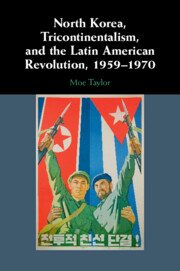Book contents
- North Korea, Tricontinentalism, and the Latin American Revolution, 1959–1970
- North Korea, Tricontinentalism, and the Latin American Revolution, 1959–1970
- Copyright page
- Dedication
- Contents
- Acknowledgements
- Abbreviations
- Introduction
- 1 North Korea and the Cuban Revolution, 1959–1965
- 2 Building the Anti-imperialist, Anti-US United Front, 1966–1970
- 3 Solidarity with the Latin American Revolution
- 4 North Korea as a Model of Development
- 5 North Korea as a Model of Development
- 6 North Korea as a Model of Revolution
- 7 The End of the Anti-imperialist, Anti-US United Front
- Conclusion
- Index
6 - North Korea as a Model of Revolution
Published online by Cambridge University Press: 18 May 2023
- North Korea, Tricontinentalism, and the Latin American Revolution, 1959–1970
- North Korea, Tricontinentalism, and the Latin American Revolution, 1959–1970
- Copyright page
- Dedication
- Contents
- Acknowledgements
- Abbreviations
- Introduction
- 1 North Korea and the Cuban Revolution, 1959–1965
- 2 Building the Anti-imperialist, Anti-US United Front, 1966–1970
- 3 Solidarity with the Latin American Revolution
- 4 North Korea as a Model of Development
- 5 North Korea as a Model of Development
- 6 North Korea as a Model of Revolution
- 7 The End of the Anti-imperialist, Anti-US United Front
- Conclusion
- Index
Summary
During the 1960s, Cuba attempted to provide leadership to the Latin American Left, and to the region’s numerous Cuban-inspired guerrilla movements in particular. In the process, Cuban leaders departed from Marxist–Leninist orthodoxy, garnering harsh criticism from their Soviet and Chinese allies. Yet Cuba found a steadfast supporter of its controversial positions in North Korea. This support can in large part be explained by the parallels between Cuban and North Korean ideas about revolution in the Third World. Most significantly, both parties embraced a radical reconceptualization of the role of the Marxist–Leninist vanguard party. This new doctrine appealed primarily to younger Latin American militants frustrated with the old communist and social–democratic organizations. It was appealing because it captured the sense of urgency created by the Cuban Revolution of 1959 and provided a path of immediate revolutionary action. The impact of the Cuban/North Korean concept of the party went beyond polemics and theoretical debates. It had a tangible influence on strategies and tactics employed by revolutionary movements in Colombia, Peru, Brazil, Puerto Rico, El Salvador, Mexico, and Bolivia, as they took up arms in the 1960s and 1970s.
Keywords
- Type
- Chapter
- Information
- Publisher: Cambridge University PressPrint publication year: 2023

